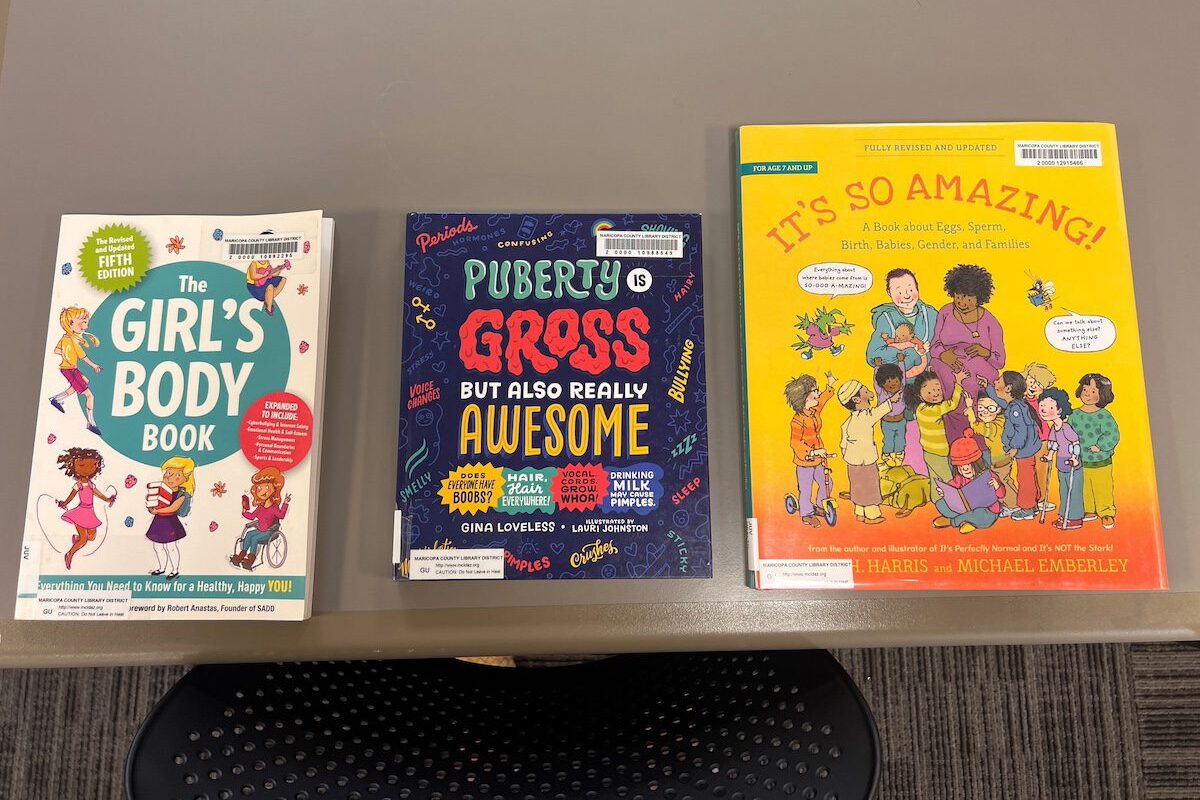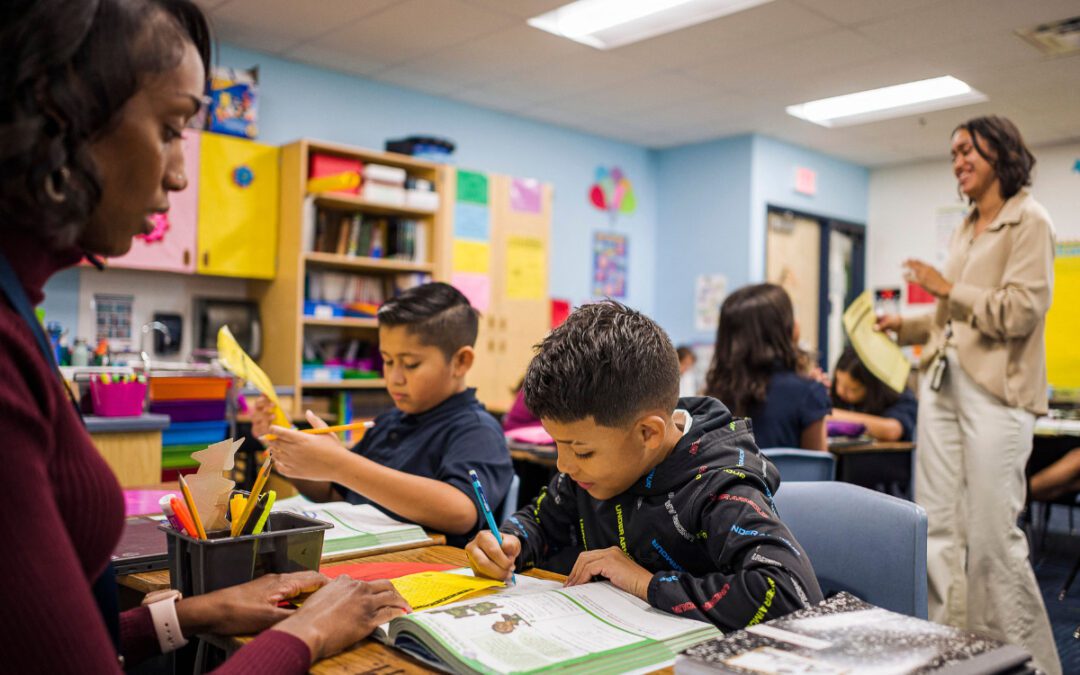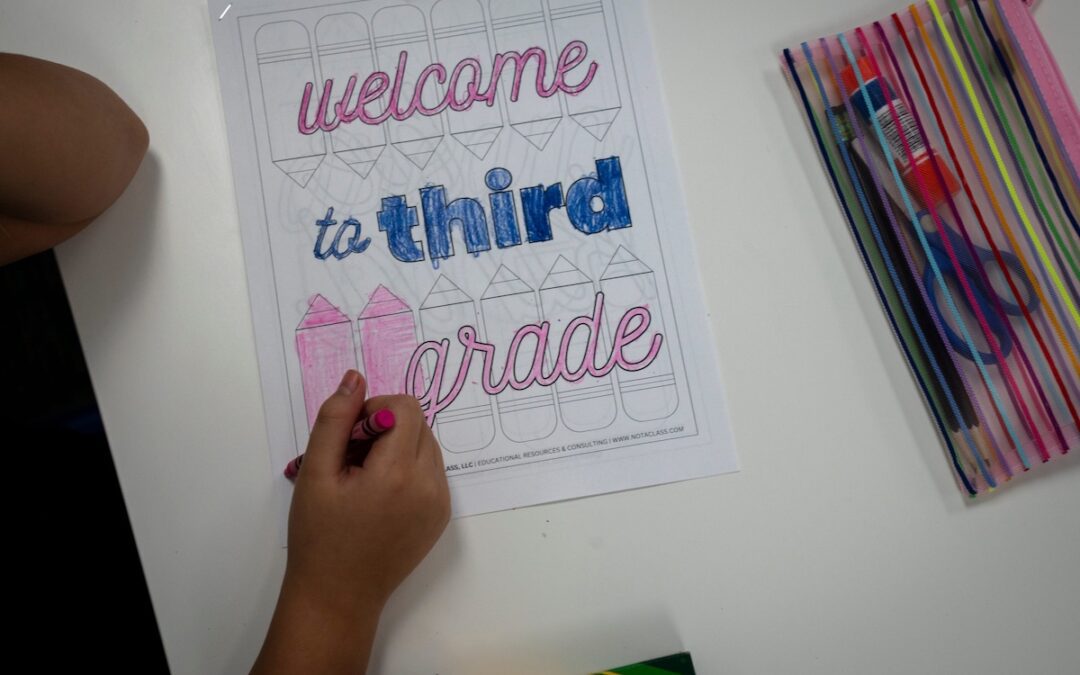
Maricopa County relocated sex-ed and puberty books from the children's section to the adult non-fiction section at its county-operated libraries across metro Phoenix after criticism from conservative, Christian activists that the books were inappropriate. (USA TODAY Network)
More than 50 sex-ed and puberty books were quietly removed from kids’ sections at 12 libraries across Maricopa County this summer after complaints from conservative Christian activists and residents.
The change is similar to actions in other states that repeatedly were struck down as unconstitutional for violating the public’s First Amendment right to access information without government suppression. Proponents of the relocation, however, believe it is protected by their First Amendment religious rights.
The changes affect libraries operated by Maricopa County and not cities that operate their own libraries, such as Phoenix.
Want Arizona news in your inbox each morning? Sign up for our free newsletter.
The books, which deal with and include illustrations of puberty, sex, gender and romantic relationships, are now on the top shelves of adult nonfiction sections at the libraries. Signs in the kids’ sections alert customers of the books’ new locations.
The county Board of Supervisors directed the changes in response to concerns that had long existed for a small faction of grassroots activists but took on new fervor after the 2024 election — when voters installed three new Republican members of the board. The supervisors also decided to allow parents to place restrictions on certain titles their kids can check out.
Their intent was clear.
“To protect our youngest from their prying eyes and curiosity,” Supervisor Mark Stewart said at a meeting June 11.
“Relocate questionable books into areas of the library that are less, or not, accessible to children,” Supervisor Kate Brophy McGee said the same day.
“Make sure that sexually explicit library books are out of the reach of minors,” Supervisor Debbie Lesko said May 21.
Yet despite pushing for the changes, supervisors voted on none of them — allowing the removal to occur without a formal public input process. County spokespeople told The Arizona Republic it was because the changes were “administrative in nature.”
The result is little public attention to the change and no legal challenges. When The Republic asked the American Civil Liberties Union of Arizona about it, spokesperson Alex Gonzalez said the organization was still learning about the situation and called it “concerning.”
The lack of pushback leaves Maricopa County’s decision in a legal gray area, creating an opening for residents to advocate further limits on books they oppose. Already, one board supervisor suggested a default restriction on certain books for kids unless their parents opt out. Arizona Women of Action, a Christian parental rights group, is advocating for the county to adopt a rating system, like with movies, so parents may restrict entire categories of books.
MORE: Federal voucher plan in Trump megabill is big win for school choice, but critics see threat to public education
First Amendment attorneys say the changes and suggestions raise questions about government imposing improper control over content. Federal judges in Arkansas and Texas have struck down policies they said “stigmatized” books, even when the books weren’t banned or removed.
Republican Supervisors Lesko, Stewart and Brophy McGee — new members who backed the changes — said the court rulings don’t change how they think about the issue.
Supervisor Thomas Galvin did not respond to a request for comment, but in public he has cautioned against government censorship while acknowledging a desire to protect children.
“What would happen if five other board members wanted to come in and regulate books that we like or appreciate or that we cherish? So obviously we have to be very careful,” Galvin said at a meeting March 26.
Supervisor Steve Gallardo, the lone Democrat, called the county’s changes “book banning” and told The Republic it stemmed from a small faction of residents who opposed the LGBTQ+ community.
“Call it whatever you want … it’s wrong, and we shouldn’t be engaging in this,” he said. Gallardo’s comments were a noteworthy shift. At a public meeting in June, he stressed parents should be responsible for monitoring their kids in libraries, but he did not criticize any of the county’s actions and said he “agreed with some of the changes.”
Gallardo said the issue was “complicated,” acknowledging that a few books were graphic enough to make him question their place in the kids’ section and he wanted parents to have more say, but worried about a “slippery slope.”
The strategy by activists to appeal directly to board supervisors is a marked difference from the traditional route to remove books, which went through librarians. Its success illustrates a shift by the new supervisors to push for changes on matters formerly left to county employees.
The effort also reflects a new tactic by the Christian right in Arizona and nationwide to reassert parental rights by arguing for religious exercise freedoms under the First Amendment.
Arizona Women of Action founder Kim Miller pointed to Arizona‘s law establishing the Parental bill of rights.
“Pushing sexual and otherwise inappropriate content in front of children not only violates parental rights to direct the upbringing of their child, but also their First Amendment rights of faith and moral expression,” Miller said.
And some activists want the books removed from libraries altogether.
Election changes bring action on book policies
Conservative activist Merissa Hamilton had lobbied the board for years to remove books that discussed sex and gender. She described the books as “pornographic,” and citing her own experience of abuse, said she believed they made kids “vulnerable” to sexual exploitation by predators.
But when the board didn’t make changes, Hamilton said she took her concerns to new candidates during election season: Stewart, Lesko and Brophy McGee.
Arizona Women of Action also got involved, urging Stewart and Lesko to take action. The group routinely calls for removing books at public schools and played a role in Scottsdale Unified School District’s decision to pull 16 books from its library shelves in February.
Within weeks, the county rolled out the “parental control” pilot program. The program launched in Queen Creek in May. Despite having no parents sign up after a few months, the county expanded the program to all 14 branch libraries. Library communications administrator Samantha Mears said it was “expanded at the direction of the Board of Supervisors.”
In June, County Manager Jen Pokorski said the county was considering a new rule that would prevent parents from leaving their kids younger than 12 at libraries alone. It’s also exploring “software solutions” to allow parents to restrict their kids’ access to entire categories of books, Pokorski said.
It’s unclear how the technology would work. County spokespeople twice declined to provide further information.
“I think the goal of the new software would be, the books that we’ve deemed — or that have illustrative pornography, will be off limits to children under a certain age,” Stewart told The Republic. “And then anything that a parent would want to opt their child into, they’re welcome to sign up and do that.”
It’s unclear how Stewart or other supervisors define pornography. At meetings and in interviews, they have criticized books in the sex-ed section as too graphic for minors, and activists have repeatedly referred to sex-ed books as pornographic. But Stewart also told The Republic, “I did not say that sex-ed books are illustrative pornography.”
Stewart said his concerns of graphic illustrations remained the same whether the depictions showed heterosexual couples or LGBTQ+ relationships.
He, Lesko and Brophy McGee repeatedly called the county’s changes a “common sense” way to protect kids, and said most parents agreed with them. Brophy McGee, who suggested in June that the county should place a default ban on certain books unless parented “opted-in,” stressed that her intent was to give parents more control.
Libraries received only 12 formal objections since 2021
Changes brought by the supervisors’ stand in contrast to how library administrators historically have dealt with book objections.
Despite fierce opposition to certain kids books by conservative activists, Maricopa County, which serves 144,000 library cardholders, received only 12 formal letters asking for reevaluation of library books and DVDs since 2021. Ten were rejected in formal response letters.
Two were accepted pertaining to animated DVDs that librarians said were mistakenly placed in the kids’ section.
Concerns included graphic illustrations, discussion of drug or alcohol use and transgender acceptance.
“It is teaching my child that it is OK to be transgender … highly inappropriate material,” one submitter wrote about the book, “Call Me Max.” Another submitter pointed to a depiction of “adults in bed obviously having intercourse with a child peeking into their bedroom.”
One complaint criticized depictions of male genitalia in a book called, “Tell Me: What Children Really Want to Know about Bodies, Sex and Emotions.”
In a response letter, collection administrator Laura Jamison said in part, “It must be understood that a nonfiction book in the JUV HEALTH – SEX section will contain information about sex, including genitalia, though some of the drawings may be surprising to American readers.”
The library’s response letters repeatedly noted that its customer base was diverse with different informational needs, and that not all material was suitable for every reader.
“It’s a good idea to supervise young children using the library, especially if as a parent or guardian there aretopics you don’t want to give the child access to yet,” Jamison told one submitter in 2021. “Books specifically written for children are categorized in the juvenile section, as opposed to books written from a parenting angle, which are in the Adult nonfiction section.”
Federal courts have repeatedly struck down efforts to limit book access
Whether libraries can create policies that allow parents more control over what books their kids read depends on how they do it, courts have ruled.
The primary question is the motivation of the government, First Amendment experts told The Republic. Problems arise when actions are driven by government officials’ personal ideological preferences and desires to limit different views, attorneys at Foundation for Individual Rights and Expression and Student Press Law Center said.
The First Amendment protects not just public speech and expression against government retaliation but also the public’s ability to access information without government censorship. The U.S. Supreme Court in 1982 said access to ideas was a “necessary predicate” to the “meaningful exercise” of one’s speech, press and political freedom rights.
“If there’s going to be any government involvement, the least intrusive approach is probably one where library materials remain fully accessible by default and parents can request that their own kids not be able to check out specific titles,” said Aaron Terr, an attorney at the free speech organization Foundation for Individual Rights and Expression. “What raises more serious First Amendment concerns is when the government itself decides who can access what, or sets up a system that defaults to restrictions and forces parents to opt in for full access.”
Jonathan Gaston-Falk, an attorney at the Student Press Law Center, said a rating system akin to movies could be seen as suppression, particularly if the government is deciding the ratings.
“As soon as something gets into the R category … it’s going to significantly restrict that access,” Gaston-Falk said. “If there is significant buy-in from the community about these decisions, maybe it would qualify some of those concerns about a heavy handedness about content control from the government.”
Federal courts nationwide have repeatedly favored open access to books.
In 2000, residents in Texas had religious objections to two children’s books about gay and lesbian parents. They failed to get the library to pull the books, so they pressured city councilmembers, who obliged them. The Wichita Falls City Council passed a rule allowing the moving of kids’ books to the adults’ section if at least 300 petitioners asked the library.
The federal Northern District Court of Texas struck it down, saying it “unconstitutionally” gave 300 people a “heckler’s veto,” allowing them to suppress “lawful, fully-protected expression simply because of their adverse reaction to it.”
The opinion also said the First Amendment “indisputably protects the right to receive information” and that right is “vigorously enforced” in public libraries.
In a 2003 federal court case, Counts v. Cedarville School District, an Arkansas school board was sued for making Harry Potter books available only to students with parental permission. The federal Western District of Arkansas Court said the action violated the First Amendment because it “stigmatized” books and thereby restricted access, without justification.
Two key points in the case were that board members who personally opposed the books took the action against the input of an advisory committee, and that the board members’ action was based on speculative, not actual, fears of disruption.
The opposition to restricting book access has continued in recent court cases.
In a 2023 federal court case, Virden v. Crawford County, an Arkansas county was sued for relocating all children’s books involving LGBTQ+ themes to a newly created “social section.” The plaintiffs argued the displacement was motivated by a desire to limit readers’ access to books with viewpoints that are unpopular and controversial in the area.
The county argued the action didn’t violate First Amendment rights because the books were still available to all library users — a point Lesko, Brophy McGee and Stewart stressed for Maricopa County’s action.
But the federal Western District of Arkansas Court said that “makes no difference for the purposes of the First Amendment.”
“This issue is whether public libraries have an obligation not to stigmatize disfavored viewpoints that are already in their collection. … they do,” the court said.
Taylor Seely is a First Amendment Reporting Fellow at The Arizona Republic / azcentral.com. Do you have a story about the government infringing on your First Amendment rights? Reach her at tseely@arizonarepublic.com or by phone at 480-476-6116.
Seely’s role is funded through a collaboration between the Freedom Forum and Journalism Funding Partners. Funders do not provide editorial input.
This article originally appeared on Arizona Republic: 12 Phoenix-area libraries quietly remove sex-ed books from kids’ sections
Reporting by Taylor Seely, Arizona Republic / Arizona Republic

Explained: Universal school vouchers are destroying Arizona’s budget, but it doesn’t need to stay this way
In 2022, former Gov. Doug Ducey signed a bill into law that set the stage for the current state of education funding in Arizona. House Bill 2853...

Why Arizonans could see more prayer at local school board meetings
After Arizona school board members were shut down for praying at governing meetings, Republicans in the Legislature want to make sure it doesn't...

Arizona has a teacher shortage. The state’s top education officials say this fueled it
A survey from the Arizona Department of Education shows over 4,200 teacher positions are filled by long-term substitutes, student teachers,...

The shutdown is hurting schools whose budgets are mostly federal money
In Chinle, Arizona, financial distress caused by the government shutdown has led to the suspension of after-school programs, including some that...




